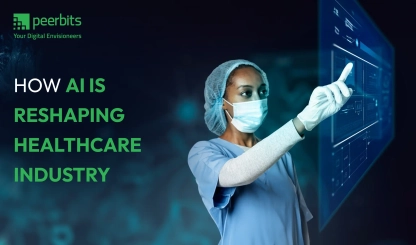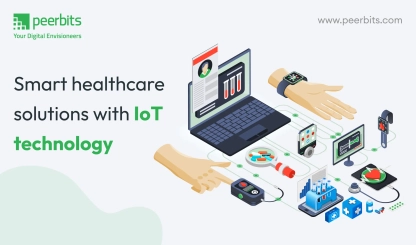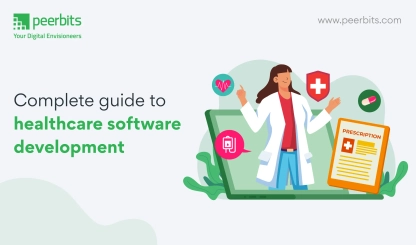The healthcare industry has experienced a tremendous change in terms of technology. In the past decade, custom healthcare software development has redefined patients' and medical professionals' approaches toward healthcare. With increased requirements for personalized medical care and improved healthcare efficiency, innovative healthcare software development has become a game-changer(source).
From AI-powered diagnostics to robotic surgeries, you can see today’s healthcare is much like Sci-fi movies. The companies are competing to create innovative and efficient healthcare software development solutions to simplify complex medical treatments.
According to recent studies, the global healthcare IT market was estimated to $394.6 billion in 2022 and is expected to reach $974.5 billion by the end of 2027 at a massive CAGR of 19.8%. It also states that the growth of the healthcare IT market is driven by HCIT solutions like e-prescriptions, mHealth, and telehealth.
The possibilities for innovation are endless in this ever-changing field of healthcare and you simply cannot underestimate the role of healthcare software development. This bespoke software development for healthcare allows medical professionals to analyze effective treatment modules and engage more closely with patients.
So, Let’s explore some of the key trends in custom software development for healthcare that redefine patient treatment and care.
1. Augmented Reality and Virtual Reality
VR and AR technologies are being used in healthcare for training, patient education, and surgical planning. Augmented Reality when combined with virtual reality can create virtual environments that can be experienced by patients, mentally preparing them for surgeries.
Furthermore, these techniques are designed to help medical professionals improvise their skills during the procedures, enhancing success possibilities.
The accurate use of these two technologies in healthcare software development can negate human errors to improve the operative success rate. You can discuss your AR and VR requirements with a reputed healthcare software development agency to get the best possible outcome for your hospital and patients.
2. Cybersecurity
Right from data breaches to malicious activities, healthcare software development solutions are also prone to cyber thefts.
According to Statista reports published in January 2024, the highest average cost of data breaches was detected in the healthcare industry in the US, causing a loss of $11 million.
Therefore, protecting patient data is one of the important future trends that need to be integrated into healthcare software development. The healthcare software development can help you with the following important activities:
The healthcare software development can help you with the following important activities:
- Prevent unauthorized access
- Integrate multiple-factor authentication
- Create a centralised approach for storing data
- Provide end-to-end encryption for sensitive data
- Carefully maintain electronic data and assets including EHRs, RISs, CDSSs and e-prescriptions.
To protect your healthcare system from malware, cyber threats and malicious activities, you just need to invest in robust software. Connect with a healthcare software company, that follows the best cybersecurity practices proposed by cybersecurity experts to minimise the risks associated with data breaches, hacks and malware.
3. Artificial Intelligence in Healthcare
Artificial intelligence in healthcare can deliver promising results. The availability of massive data, better machine learning algorithms, innovative software development and interconnected 5G devices have contributed to the increase of AI in the healthcare industry. It can analyse, record and mimic human health patterns by interpreting health data.
Medical reports can have accurate diagnostics through algorithms that are plugged into artificial intelligence. Not only diagnostics, but it can also predict future health problems by analyzing the medical history of any patient. AI can make healthcare more efficient by:
- Overtaking redundant manual tasks of data handling to save resources
- Virtual nursing assistant that supports round-the-clock
- Dosage error reduction for self-administered patients
- Less invasive surgeries, that result in reduced blood loss
- Identifying unusual patterns of insurance claims, preventing fraud
Additionally, the data from healthcare software development relies on artificial intelligence which helps to automate and predict different outcomes such as patient admissions or chronic health risks.
To get the best result from healthcare AI, you need to partner with the right company offering custom healthcare software development services to understand the advanced generative AI and its impact on software development.
4. IoMT (Internet of Medical Things)
The COVID-19 pandemic has given rise to a trend called IoMT or Internet of Medical Things. What it means is the Internet of Things (IoT) used in the health sector.
The use of IoT combined with MedTech tools makes healthcare more interconnected than you ever thought. IoMT includes remote patient monitoring that tracks patients’ medication orders, where they have been admitted to hospitals and many other functions.
In short, this is an effective long-term strategy for bringing numerous advantages to healthcare apps helping you with:
- Monitoring patients remotely
- Enabling better workflows
- Promoting care delivery excellence
- Amazing patient experience
- Minimizing overall costs incurred by patients
5. Big Data Analytics
Big Data is one of the most influential technologies that enable you to use your daily compiled data for health systems. Healthcare produces about a third of the world’s data, and you must utilize such massive data to provide good medical treatment.
No doubt by hiring the right healthcare software developer, hospitals and healthcare systems can gain a competitive edge in the digital realm.
You can obtain valuable insights using big data analytics software and tools in the following ways:
- Reviewing patient records, genetic information and medical images for diagnostic support and treatment research
- Personalizing treatments and medications based on patient details towards better response outcomes with reduced side effects
- Predicting likely risk factors, patient’s prognosis or onset of disease by determining some trends and associations drawn from health care related information
- Tracking larger population health patterns, changes in epidemiology conditions and coming up with strategies for avoiding spread of diseases
6. Blockchain for Data Security
Software development in healthcare has seen a growing interest in blockchain as an emerging trend. It ensures transparency, security and innovation thus changing Health Tech. It optimizes administrative activities while minimizing the chances of breaching health data.
There is a host of ways where blockchain serves as a secure decentralized platform. This system keeps medical records safe for you and outreach to the general public, medical professionals or insurance firms. Blockchain could potentially revolutionize software development in healthcare due to its efficiency, accuracy and security for the healthcare system.
It can be used globally; with major companies like Google and Microsoft investing heavily in blockchain studies related to healthcare. The market size would grow up to $7308 million at a CAGR of 76.30% over the 2021-2028 time period.
There is no doubt that blockchain is way more important when it comes to enhancing custom healthcare software development.
7. Cloud Transformation
The future of patient care is being redefined through integration between cloud technology and the healthcare industry which improves on service delivery by improving on areas such as healthcare software development.
Cloud transformation means moving business elements including applications, data; and services from physical storage to a cloud network for better operations, Cloud transformation offers;
- Streamlined operations
- Real-time access to important data
- Appropriate deployment of software
- Improves patient care
From big hospitals down to small clinics, healthcare systems have adopted cloud technologies to streamline their operations. Hence, hospitals have adopted cloud technology to better manage critical data thus streamlining their operations and deploying healthcare software solutions faster and more efficiently.
Final thoughts
Integrating the key trends in healthcare software development can help you to deliver positive patient experiences, reduce human errors, and assist your medical staff in giving optimum performance. The advanced software capabilities also help you to get a competitive edge in the healthcare domain.
Right from enhanced security to operational flexibility, innovative healthcare software can make a great impact on your organization. All you need is to partner with a custom healthcare software development company that can make a huge leap in your organizational efficiency, delivering supreme patient care.









